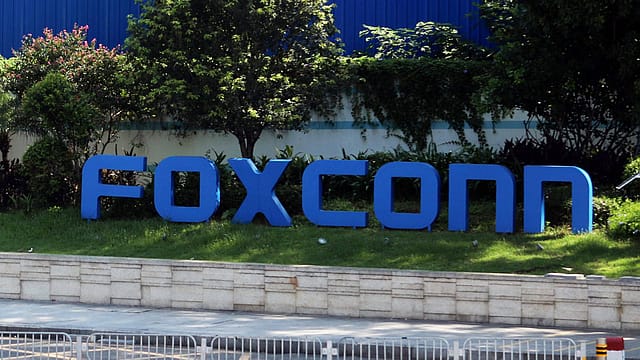Foxconn pulls out of ₹1.54-lakh cr JV with Vedanta
ADVERTISEMENT

In a setback to the country's plans to become a key semiconductor hub, Taiwan's electronics major Foxconn has reportedly pulled out of a joint venture with metals-to-oil major Vedanta Ltd, which was set up to make chips here.
"Foxconn will not move forward on the joint venture with Vedanta. Foxconn is working to remove the Foxconn name from what now is a fully-owned entity of Vedanta," a global news agency quoted Taiwanese chips major as saying.
However, Vedanta says it is "fully committed" to its semiconductor fab project and has lined up other partners to set up India’s first foundry. "We will continue to grow our Semiconductor team, and we have the license for production-grade technology for 40 nm from a prominent Integrated Device Manufacturer (IDM). We will shortly acquire a license for production-grade 28 nm as well," a company spokesperson says.
He adds that Vedanta has "redoubled its efforts to fulfill the Prime Minister's vision for semiconductors and India remains pivotal in repositioning global semiconductor supply chains.”
Vedanta in February this year partnered with chip electronics major Hon Hai Technology Group, which is the world's largest contract electronics manufacturer and the supplier of Apple iPhone, to produce semiconductors in India as the country eyes to reduce dependence on the imports of key electronics components.
Vedanta was supposed to hold a majority of equity in the JV, while Foxconn was the minority shareholder. The JV was expected to boost Prime Minister Narendra Modi’s vision to create an ecosystem for semiconductor manufacturing in India.
The Anil Agarwal-led Vedanta Group and Foxconn had selected Dholera Special Investment Region (SIR) in Gujarat for setting up India’s first semiconductor manufacturing facility. The ₹1.54 lakh crore worth of JV was likely to generate around one lakh direct jobs.
Vedanta in a statement last week had announced the addition of “semiconductors and display glass manufacturing ventures” to its diversified portfolio. "The acquisition will be effected by way of a share transfer at face value of Twin Star Technologies Limited’s (“TSTL”) Semiconductor and Display SPVs. TSTL is a wholly-owned subsidiary of Volcan Investments Limited, the ultimate holding company of Vedanta Limited."
As per Vedanta, it represents a large growth opportunity for India, where the semiconductor market stood at $24 bn in 2022 and is estimated to reach $80 bn by 2026. "The display panel market is estimated to be worth $7bn and is expected to grow to $15bn by 2025."
Currently, India imports 100% of these requirements. "The global semiconductor industry is at an exciting juncture. India is in a sweet spot to capitalize as the world looks to diversify critical supply chains in semiconductors and display fab."
The company said in approving these acquisitions, the board of Vedanta believes Vedanta and its shareholders, as well as India’s economy, can benefit from the opportunity these shifting global dynamics provide.
Semiconductor is a key component in the manufacturing of electronic devices, mobile phones, cars, and electric vehicles. Currently, Taiwan accounts for more than 90% of the semiconductor manufacturing in the world, followed by the Netherlands, and South Korea. However, over the past few years, the political turmoil in Taiwan has led to a semiconductor crisis globally.
India’s semiconductor component market is expected to rise manifold to touch the total revenue worth $300 billion during 2021-2026, joint research by the India Electronics & Semiconductor Association (IESA) and Counterpoint Research has revealed. The share of local sourcing is expected to grow to over 17% by 2026, which translates into a six-fold rise in locally-sourced semiconductor revenues.
Amid the development, the Vedanta stock rose 0.68% to close at ₹282.45 on the NSE today.